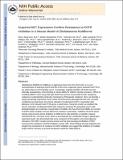Acquired MET expression confers resistance to EGFR inhibition in a mouse model of glioblastoma multiforme
Author(s)
Jun, Hyun Jung; Acquaviva, Jaime; Chi, D.; Lessard, Julie; Zhu, H.; Woolfenden, S.; Bronson, Roderick T.; Pfannl, R.; Iyer, L.; Boskovitz, Abraham; Raval, A.; White, Forest M.; Whittaker, Charles A.; Charest, Alain; Housman, David E; ... Show more Show less
DownloadHousman_Acquired MET.pdf (4.860Mb)
OPEN_ACCESS_POLICY
Open Access Policy
Creative Commons Attribution-Noncommercial-Share Alike
Terms of use
Metadata
Show full item recordAbstract
Glioblastoma multiforme (GBM) is an aggressive brain tumor for which there is no cure. Overexpression of wild-type epidermal growth factor receptor (EGFR) and loss of the tumor suppressor genes Ink4a/Arf and PTEN are salient features of this deadly cancer. Surprisingly, targeted inhibition of EGFR has been clinically disappointing, demonstrating an innate ability for GBM to develop resistance. Efforts at modeling GBM in mice using wild-type EGFR have proven unsuccessful to date, hampering endeavors at understanding molecular mechanisms of therapeutic resistance. Here, we describe a unique genetically engineered mouse model of EGFR-driven gliomagenesis that uses a somatic conditional overexpression and chronic activation of wild-type EGFR in cooperation with deletions in the Ink4a/Arf and PTEN genes in adult brains. Using this model, we establish that chronic activation of wild-type EGFR with a ligand is necessary for generating tumors with histopathological and molecular characteristics of GBMs. We show that these GBMs are resistant to EGFR kinase inhibition and we define this resistance molecularly. Inhibition of EGFR kinase activity using tyrosine kinase inhibitors in GBM tumor cells generates a cytostatic response characterized by a cell cycle arrest, which is accompanied by a substantial change in global gene expression levels. We demonstrate that an important component of this pattern is the transcriptional activation of the MET receptor tyrosine kinase and that pharmacological inhibition of MET overcomes the resistance to EGFR inhibition in these cells. These findings provide important new insights into mechanisms of resistance to EGFR inhibition and suggest that inhibition of multiple targets will be necessary to provide therapeutic benefit for GBM patients.
Date issued
2011-10Department
Massachusetts Institute of Technology. Department of Biological Engineering; Massachusetts Institute of Technology. Department of Biology; Koch Institute for Integrative Cancer Research at MITJournal
Oncogene
Publisher
Nature Publishing Group
Citation
Jun, H J, J Acquaviva, D Chi, J Lessard, H Zhu, S Woolfenden, R T Bronson, et al. “Acquired MET expression confers resistance to EGFR inhibition in a mouse model of glioblastoma multiforme.” Oncogene 31, no. 25 (October 24, 2011): 3039-3050.
Version: Author's final manuscript
ISSN
0950-9232
1476-5594